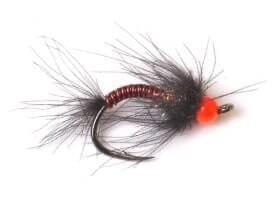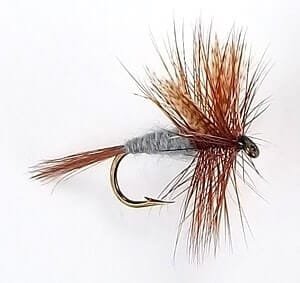When it comes to fly fishing, placing an artificial fly over the water surface for the fish to strike is everything you need to do. You need to fool the fish in the perfect way so that it would strike on your fly. To do so, tippet is one of the most essential equipments you need to look for. You need to dive in into the overall idea that includes how long should tippet be, proper usage of a tippet for fly fishing, no matter what kind of fish you are about to catch.
The tippet that you will be using needs to have soft and lightweight nylon where you will be tying the artificial fly. It is good to prefer just a single section of tippet for using while fishing in polluted water or while looking for a larger fish. But, when you are fishing in safe and clear water where the fish can easily notice about your presence, it is better to multiple sections of tippet. We will let you know about the length of tippet you need to be using for fly fishing in this guide.
Some of The Best Tippets For You
Table could not be displayed.
What is a Tippet?
Tippet is one of the most essential equipments you really need to care about while purchasing fly fishing kits. It is the last soft nylon part which is connected to your fly leader. It is the smallest mono-filament gauge line on your fly fishing kit since it has to appear as an invisible item for a fish to strike on the fly. This is the place where you will be tying your artificial fly and it needs to be smooth and flexible so that the flies can float on the water like real food organisms. You can find several tippets with strength compatible with several weights of flies.
Tippet is also used in your fly fishing kit to help in increasing the lifespan of your fly leader. If you don’t use tippet and just tie the flies at the end of the leader, the leader might start degrading its tapering and can cost you a lot to purchase a new one. This is why a tippet designed with a soft and lightweight nylon can save a lot of money by preventing the degradation of the leader’s tapering.
You can generally find tippet which is suitable to use with your leader since it is nearly equal or a bit smaller than the entire diameter of the end of the leader. Most of the available tippets in the market have a length of around 60 to 120 centimeters. It is recommended to use a lighter fly for your tippet since it can really help you in making the fly behave naturally rather than tying a heavier fly which may move your fly fishing line move and result in the fly to look more artificial.
Tips On Choosing Your Tippets
There are different sizes of tippets are available. These tippets usually depend upon the size of your leader‘s end and the weight of the flies you will be tying. As discussed earlier, if you are going to use smaller flies, it is better to use small and flexible tippets so that the flies can behave in a more natural way. When you are using larger flies, a larger tippet is needed which needs to contain a stiffer tip size.
The fish may not see your tippet due to their small size, but they can easily notice the behavior of your fly to determine if it is natural or artificial. There are several kinds of tips available for tippets which are listed below:
If you are using fluorocarbon tips, the tippet can sink into the water surface resulting in its lifespan getting degraded. When you are using fluorocarbon tips for your tippet, it is better to keep replacing the tippet every few years. If you are planning to use mono-filament or nylon tips, the tippet will easily float on the surface and can be highly beneficial for dry flies.
Pro Tip: Getting a premium grade tippet is the top priority since it can help a lot in making the fly look natural.
How To Attach A Tippet
Attaching a tippet with your fly leader is very simple. You can place both of them side by side and attach them with the loop-to-loop method. You can use both lines to create a loop with proper overlap so that you can tie them in a surgeon’s knot. Then, you can pull both ends through the loop and repeat the process one more time. Finally, you can lubricate the knot you are using, pull it off and cut off the ends.
You can also attach them with a tip ring. You can insert a strong mono-filament inside the tip ring and bend it. Now, you can connect your leader just by gripping the threading of mono-filament in the tip ring.
How Long Should Tippet Be?- Proper Guide
Small or Large Tippet
There is no exact size for a tippet. It depends on upon the size of flies you will be using. If you are going to use tiny flies, you can prefer a small tippet for fly fishing. In the case of larger flies, it is better to prefer a bigger tippet to make the flies look more natural. You really need to look into this matter in depth since if you use smaller tippet for larger flies, the fish will easily recognize the abnormality of the flies and detect them as a trap. If you use a larger tippet, there will be fewer chances of having your fly line move a lot. You will also be able to cast the fly properly on the surface of the water. One more beneficial stuff about a larger tippet is that it can easily pull itself off the grass.
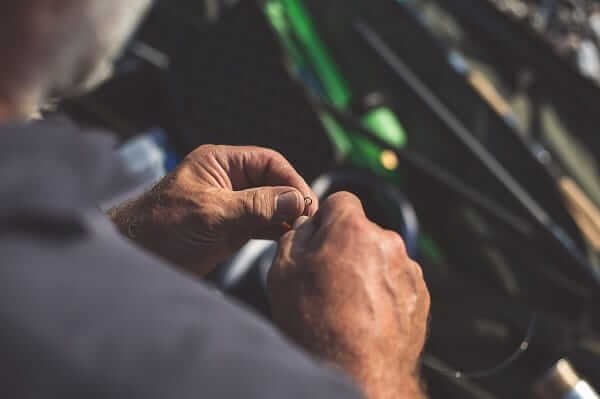
What If You Are A Newbie
If you are new to fly fishing, it is better to consider using a larger tippet. However, it is not the only thing you need to do. You need to attach the tippet properly with the leader and allow the artificial flies to behave naturally. Using very large tippet for a tiny fly can be a major disadvantage since the fly will not look natural for the fish and it won’t strike on it. It doesn’t matter how flexible the tippet is. The only thing there needs to be is the natural behavior of the flies tied in the tippet. The flies need to behave like nymphs, streamers and actual dry flies to easily fool the fish.
You can find tippets of different sizes. Usually, the size of tippets is mentioned depending upon their diameter. The “X” symbol is generally used for tippets of different sizes. This symbol is used to define the diameter of a tippet. If the number in front of the symbol is lower, the tippet is more stronger as well as bigger. If you use a tippet having a diameter of 0.007″, it will be presented as a 4X tippet while purchasing. A 5X tippet is always larger than a 6X tippet as well as more rigid than the 6X tippet. Using a tippet with a lower number in front of the “X” symbol would help you to cast the fly properly. From the following table, developed by Bill Byrd Jr., it will be much clear that how large or small your tippet should be.
Rod weight | Tippet Size in X | Tippet diameter | Pound Test | Suggested Fly Size |
5-7 weight | 0X | .011 inches | 9.0 pounds | size-4 to size-6 |
5-7 weight | 1X | .010 inches | 7.2 pounds | size-4 to size-8 |
| 3-4 weight | 2X | .009 inches | 6.3 pounds | size-4 to size-10 |
3-4 weight | 3X | .008 inches | 5.2 pounds | size-6 to size-12 |
| 1-2 weight | 4X | .007 inches | 4.3 pounds | size-6 to size-14 |
1-2 weight | 5X | .006 inches | 3.3 pounds | size-14 to size-20 |
| 1-2 weight | 6X | .005 inches | 2.1 pounds | size-18 to size-26 |
0 weight | 5X-7X | .006-.004 inches | 3.3-1.2 pounds | size-20 to size-28 |
0 weight | 6X-8X | .005-.003 inches | 2.1-1.0 pounds | size-20 to size-28 |
| 00 weight | 7X-11X | .004-.001 inches | 1.2-.4 pounds | size-26 to size-32 |
| 000 weight | 8X-12X | .003-.0009 inches | 1.0-.3 pounds | size-28 to size-32 |
Table Courtesy: The X rating system for leaders and tippets by Bill Byrd.
Moreover, here is a quick guide that will help you to choose the perfect tippet size for different types of flies. You will also get to know about the best tippet material for each fly.
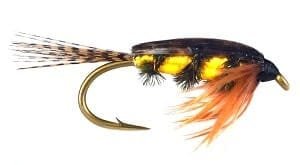
 Nymphs
Nymphs
- Size less than 19: 6-7X fluorocarbon tippets
- Size between 12 and 16: 5X fluorocarbon tippets
- Size between 10 and 12: 4X fluorocarbon tippets
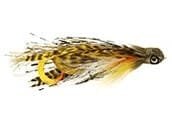
Streamers and Stonefly Nymphs
- Size between 6 and 8: 3X fluorocarbon tippets
- Size less than 5: 0-2X fluorocarbon tippets
Steelhead Spey

Steelhead Nymph Fly Best Tippet Size and Material: 0X Fluoroflex Plus tippets
Steelhead Nymphs
- Big flies: 1X tippets
- Smaller to medium size flies: 2X tippets
- Small flies: 3X tippets (for clear water during summer time)
Dry Flies

Dry Fly Size less than 18: 6-7X Powerflex or Powerflex Plus tippets
- Size between 12 and 16: 4-5X Powerflex or Powerflex Plus tippets
- Size between 8 and 10: 4X Powerflex or Powerflex Plus tippets
Big Chernobyl Ants and Grasshoppers
- Size 6: 3X Powerflex or Powerflex Plus tippets
Other Large Flies
- Best Tippet Size and Material: 1-2X Powerflex Plus
Wrapping Up!
With the completion of our guide on choosing the best tippet length for different sizes and types of flies along with the best tippet material, we believe you would be able to choose the best tippet size depending on what kind of flies you will be tying on the tippet for fly fishing. We can’t ensure you the exact length of the tippet since it depends on the condition, size of flies and type of flies you will use. However, choosing a larger tippet will certainly help you if you are a beginner in fly fishing. If you are using tiny flies, then it isn’t good to use large tippets since the behavior of flies mightn’t look natural to the fish.
Everything you ought to do while fly fishing is trying to make your artificial flies behave naturally to the fish so that the fish will strike on them. If you have any issues regarding the length of tippet you need to use for fly fishing, you can feel free to write down in the comments with all your requirements and what kind of flies you will be using. We’d try to respond back to right away.


